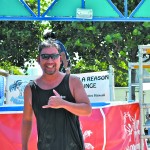Earth/Sky/Mauka/Makai
For weeks, Ryan Sakagawa has been reaching out to family, friends and co-workers through social media, fliers, emails and just about any other platform he can think of for cash donations — all so he can dive into 34-degree water 12 times over 12 hours.
But, as he says on his FirstGiving fundraising page, he will be “freezin’ for a reason.”
- Special Olympics Hawaii still is accepting registration for its 2015 Polar Plunge. Go down this 80-foot slide, and you’ll help raise money to fund Special Olympics programs.
- As a Super Plunger in this year’s Polar Plunge, Ryan Sakagawa will slide into ice-cold water at least 12 times March 28 PHOTOS COURTESY SPECIAL OLYMPICS HAWAII
- Ryan Sakagawa
It’s all in name of the Special Olympics Hawaii’s annual Polar Plunge — and Sakagawa has signed up to be a Super Plunger, meaning he will take dips in the just-barely-above-freezing water throughout the course of the event. The 2015 Polar Plunge takes place March 28 at Waterfront Plaza. (Plunge times for the general public begin at 10 a.m., but Super Plungers like Sakagawa get started at 6.)
Committing to be a Super Plunger might sound a little nuts, but Sakagawa is well aware of what he’s signed up for: This is his sixth year participating — and his fifth time as a Super Plunger.
“It’s something that I like volunteering for,” he says.
In addition to his yearly participation in Polar Plunge, Sakagawa, a budget analyst for the Air Force, is an active volunteer with Special Olympics as a whole. He also helps out with its summer games and other events throughout the year.
Growing up on Maui, Sakagawa had a few classmates with special needs. Later, as a volunteer with Special Olympics, he saw how its programs impacted the kids.
“You definitely see it in their faces and their expressions … when they are running or throwing a softball or doing these things that they don’t get to do with other kids their age,” Sakagawa says.
It’s programs like this that Polar Plunge funds.
“What it will do, in general, is help us provide all of our competitions and trainings free of charge for our athletes and their families,” explains Special Olympics Hawaii development manager Tracey Bender. “We do over 40 area games a year, and we have three state games on the island of Oahu. All of the competition, including air fare, ground transportation, meals and lodging — all of that is absolutely free for our athletes.”
Polar Plunges take place at Special Olympics chapters throughout the country. Typically, in East Coast and Midwestern cities, participants dive into naturally frosty lakes or oceans — but here, it’s an 80-foot-long inflatable slide, as well as an above-ground pool. (According to Sakagawa, local plungers do have one distinct advantage: “You have to build up the courage, but once you go in and you get out, you’re fine. We’re in Hawaii, so once you come out, it’s 70 degrees.”)
Plungers raise money for the event in the weeks leading up to it (each adult is asked to raise a minimum of $100 and students are asked to raise a minimum of $50). Special Olympics Hawaii has raised more than $250,000 for athletes through Polar Plunge since 2008. Plus, all funds raised at the event stay in the state to directly benefit local athletes.
In addition to raising funds for Special Olympics programs, Polar Plunge also is an opportunity for the nonprofit to raise awareness about its mission. In conjunction with that goal, this year’s Polar Plunge is a full-blown community event filled with water-related activities, such as a water balloon toss, and that Water War game from The Tonight Show Starring Jimmy Fallon.
To date, Sakagawa has raised nearly $7,000 for Special Olympics through Polar Plunge. This year, his fund-raising goal is $1,250, and as of late last week, he’d already surpassed it. But beyond that, he hopes that his outreach efforts net understanding and respect for those with special needs.
“The more people I reach out to for donations, the more people understand Special Olympics’ mission,” Sakagawa says.
To donate to Sakagawa’s campaign, visit firstgiving.com/fundraiser/ryan-sakagawa.
For more information on Polar Plunge, visit specialolympicshawaii.org.




